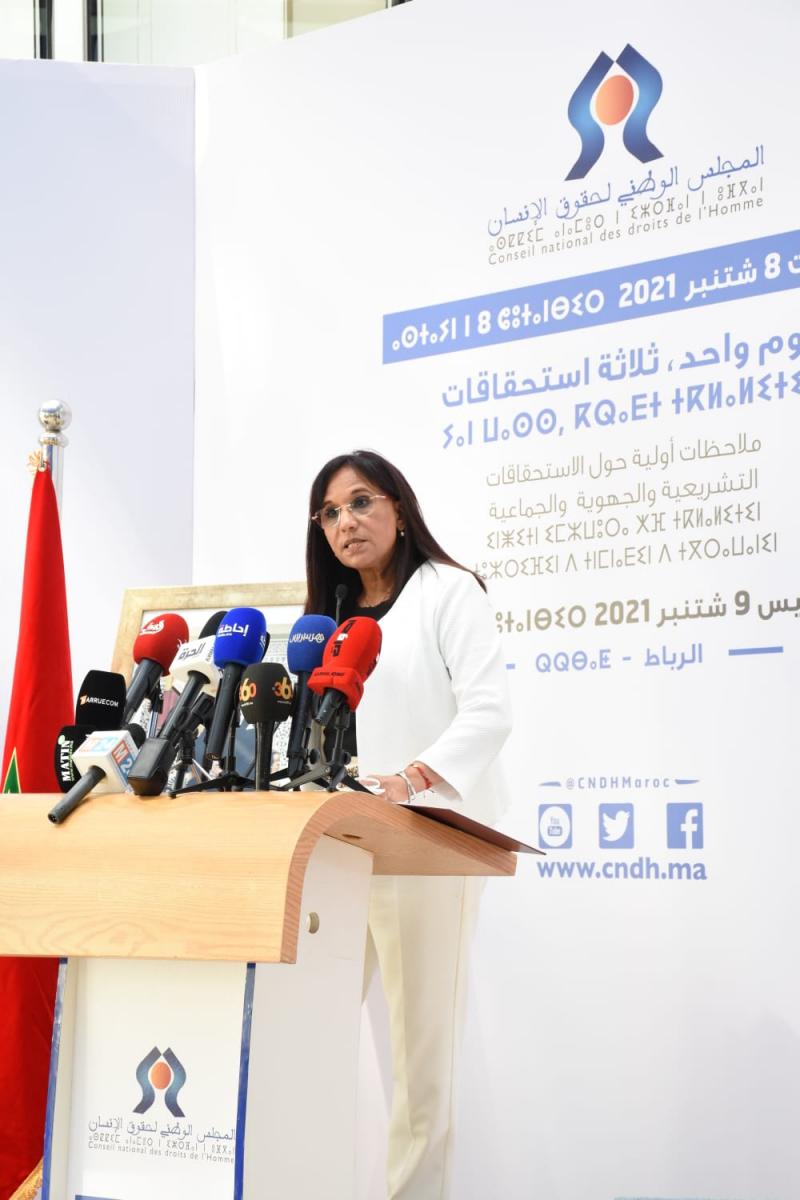Voting process took place following the procedures in force, and the CNDH observations do not broadly affect the transparency indicators, said Mrs. Bouayach

The National Human Rights Council (CNDH) held, on Thursday 9 September 2021 at its headquarters in Rabat, Morocco, a press conference.
On this occasion, Mrs. Amina Bouayach, CNDH Chairperson, presented the Initial Report on the Observation of the Legislative, Regional and Communal Elections which took place on September 8, 2021.
Mrs. Bouayach confirmed that the voting process took place following the procedures in force and that the observations conducted by the CNDH observers do not broadly affect the indicators of transparency. She also welcomed the compliance with the periodicity and regularity of elections, staged in exceptional and unprecedented circumstances to ensure the smooth functioning of the representative institutions of society.
Mrs. Bouayach indicated that these elections were held in an exceptional context marked by deep societal changes and others resulting from the serious repercussions of the COVID-19 pandemic and their ensuing social and economic damages. Moreover, the elections were held pursuant to a legal framework that provides for many changes compared to the 2015 and 2016 elections. Besides holding three elections on one day for the first time in the history of Morocco, the electoral law of 2021 specifies a higher number of cases of conflict of interest. It also raises the minimum number of inhabitants to adopt the list system in communes and provides for changes in the electoral quotient adopted in the allocation of the seats of the House of Representatives. It also establishes new mechanisms for promoting the participation of women in elected bodies.

Furthermore, Mrs. Bouayach explained that the CNDH deployed 568 observers, covering 100% of prefectures and provinces, more than 39% of territorial collectivities and 4.7% of polling stations (3% is the minimum percentage recommended by international standards).
Also, she highlighted that the CNDH has prepared 18 types of forms to be instantly filled in through an e-application developed for this purpose and allowing for real-time follow-up of the results, noting that the overall number of accredited national observers reached 4,323, as against 3,953 in the 2016 elections. 152 international observers were accredited, including 71 women.
Regarding the management of the electoral campaigns, Mrs. Bouayach confirmed that the CNDH considers that the restrictions imposed by the public authorities on electoral campaigns meet the requirement of necessity. These restrictions are also legally founded and fall under the realm of the powers legally assigned to the Government to manage the state of a health emergency.
The CNDH Chairperson also made preliminary field observations on the electoral campaign. The CNDH concluded that:
-A number of physical and verbal violence cases, new forms of discrimination against women by blocking their images from the electoral lists;
-The low participation of persons with disabilities in electoral campaigns and the degree to which their right to run for elections was respected;
-The participation of Moroccans living abroad and foreigners residing in Morocco;
-Allegations of money use and in-kind donations;
-Compliance with precautionary measures by parties and candidates;
-Lack of respect for personal data;
-Allegations regarding the impartiality of the authorities and religious attendants and the exploitation of places of worship;
-Difficulties that the observers faced while carrying out their duties.
Regarding the thematic observation, Mrs. Bouayach indicated that this type of observation relates to platforms of political parties. It focuses on whether they addressed women’s rights, rights of persons with disabilities and territorial justice. Accordingly, several preliminary observations were formulated on the types of human rights-relevant issues contained in the platforms of political parties.
Concerning the civic observation conducted by the CNDH, Mrs. Bouayach highlighted that the citizens’ participation through social media has increased and new civic initiatives contributing to public debate have emerged. The CNDH considers these platforms as human rights and freedoms incubators within an emerging model of rights and freedoms.
The CNDH also noted several calls to boycott elections, some of which even considered the participants as traitors.
Regarding the observation on the polling day (the opening of the polling stations and the functioning of the polling process), the CNDH noted that polling stations across observation sites opened under normal circumstances in compliance with the legal requirements specific to the opening of polling stations. The CNDH also noted that representatives of lists and candidates have formulated remarks or objections as regards the polling process. These include the use of mobile phones inside booths, failure to announce loudly the names of voters, and, more strikingly, objections to assisting persons with disabilities in several and significant cases.
Download the Initial Report on the Observation of the Legislative, Regional and Communal Elections (Available in Arabic)






















